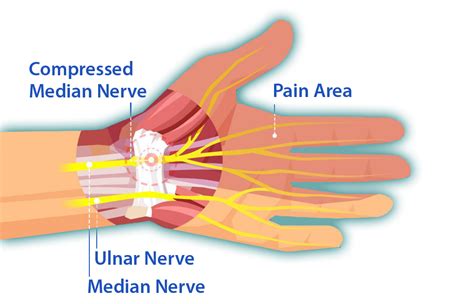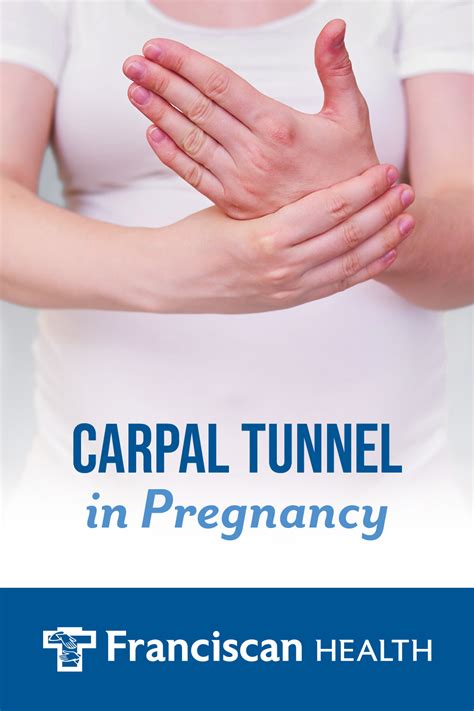Intro
Alleviate carpal tunnel syndrome during pregnancy with 5 expert tips, addressing wrist pain, numbness, and tingling, while promoting healthy nerve function and pregnancy comfort.
Pregnancy is a unique and exciting time in a woman's life, filled with numerous physical and emotional changes. One common issue that many pregnant women face is carpal tunnel syndrome, a condition characterized by numbness, tingling, and pain in the hands and wrists. This condition occurs when the median nerve, which runs from the forearm into the palm of the hand, becomes compressed or pinched. During pregnancy, fluid retention and swelling can cause the wrist tunnel to narrow, putting pressure on the median nerve and leading to carpal tunnel syndrome. In this article, we will delve into the world of carpal tunnel syndrome during pregnancy, exploring its causes, symptoms, and most importantly, providing valuable tips to help manage and alleviate this condition.
As the body undergoes significant changes during pregnancy, it's essential to understand the factors that contribute to carpal tunnel syndrome. Hormonal fluctuations, weight gain, and fluid retention can all play a role in the development of this condition. Moreover, poor posture, repetitive movements, and inadequate wrist support can exacerbate the symptoms. It's crucial for pregnant women to be aware of these factors and take proactive steps to prevent and manage carpal tunnel syndrome. By doing so, they can reduce the risk of long-term damage and ensure a healthy and comfortable pregnancy.
The symptoms of carpal tunnel syndrome can vary from mild to severe and may include numbness, tingling, or burning sensations in the hands and wrists, particularly in the thumb, index, and middle fingers. Some women may experience weakness or clumsiness in their hands, making it difficult to perform everyday tasks. In severe cases, carpal tunnel syndrome can cause pain that radiates up the arm, disrupting sleep and daily activities. If left untreated, this condition can lead to long-term nerve damage, making it essential to seek medical attention if symptoms persist or worsen over time.
Understanding Carpal Tunnel Syndrome

Causes of Carpal Tunnel Syndrome
The causes of carpal tunnel syndrome during pregnancy are multifaceted and can be attributed to various factors, including: * Hormonal fluctuations: The increase in progesterone and estrogen levels during pregnancy can cause fluid retention and swelling, leading to compression of the median nerve. * Weight gain: Excess weight can put additional pressure on the wrists and hands, exacerbating carpal tunnel syndrome. * Poor posture: Slouching or leaning forward can cause the wrists to flex, narrowing the carpal tunnel and putting pressure on the median nerve. * Repetitive movements: Engaging in activities that involve repetitive wrist movements, such as typing or knitting, can increase the risk of developing carpal tunnel syndrome.5 Carpal Tunnel Pregnancy Tips

Additional Remedies
In addition to these tips, consider the following remedies to alleviate carpal tunnel syndrome symptoms: * Apply cold or warm compresses to the affected area to reduce pain and inflammation. * Elevate your hands and wrists above the level of your heart to reduce swelling. * Avoid activities that exacerbate symptoms, such as heavy lifting or bending. * Consider physical therapy or massage to promote wrist mobility and reduce tension.Managing Carpal Tunnel Syndrome

Preventing Long-Term Damage
To prevent long-term damage from carpal tunnel syndrome, it's crucial to address the condition promptly. If left untreated, carpal tunnel syndrome can lead to permanent nerve damage, resulting in chronic pain, numbness, and weakness in the hands and wrists. By seeking medical attention and following a comprehensive treatment plan, pregnant women can reduce the risk of long-term damage and ensure a healthy and comfortable pregnancy.Carpal Tunnel Syndrome and Pregnancy Complications

Reducing the Risk of Complications
To reduce the risk of pregnancy complications associated with carpal tunnel syndrome, it's essential to: * Seek medical attention promptly if symptoms persist or worsen over time. * Follow a comprehensive treatment plan, including lifestyle modifications and medical interventions. * Maintain good posture, take regular breaks, and stay hydrated to reduce pressure on the median nerve.Conclusion and Next Steps

We invite you to share your experiences and tips for managing carpal tunnel syndrome during pregnancy in the comments below. Your insights can help other women who are going through similar challenges. Additionally, feel free to share this article with your friends and family to raise awareness about this important topic.
What are the symptoms of carpal tunnel syndrome during pregnancy?
+The symptoms of carpal tunnel syndrome during pregnancy may include numbness, tingling, or burning sensations in the hands and wrists, particularly in the thumb, index, and middle fingers. Some women may experience weakness or clumsiness in their hands, making it difficult to perform everyday tasks.
How can I prevent carpal tunnel syndrome during pregnancy?
+To prevent carpal tunnel syndrome during pregnancy, maintain good posture, take regular breaks, and stay hydrated. Avoid activities that involve repetitive wrist movements, and consider wearing a wrist splint or brace to support your wrists.
Can carpal tunnel syndrome during pregnancy lead to long-term damage?
+Yes, if left untreated, carpal tunnel syndrome during pregnancy can lead to permanent nerve damage, resulting in chronic pain, numbness, and weakness in the hands and wrists. It's essential to seek medical attention promptly if symptoms persist or worsen over time.
